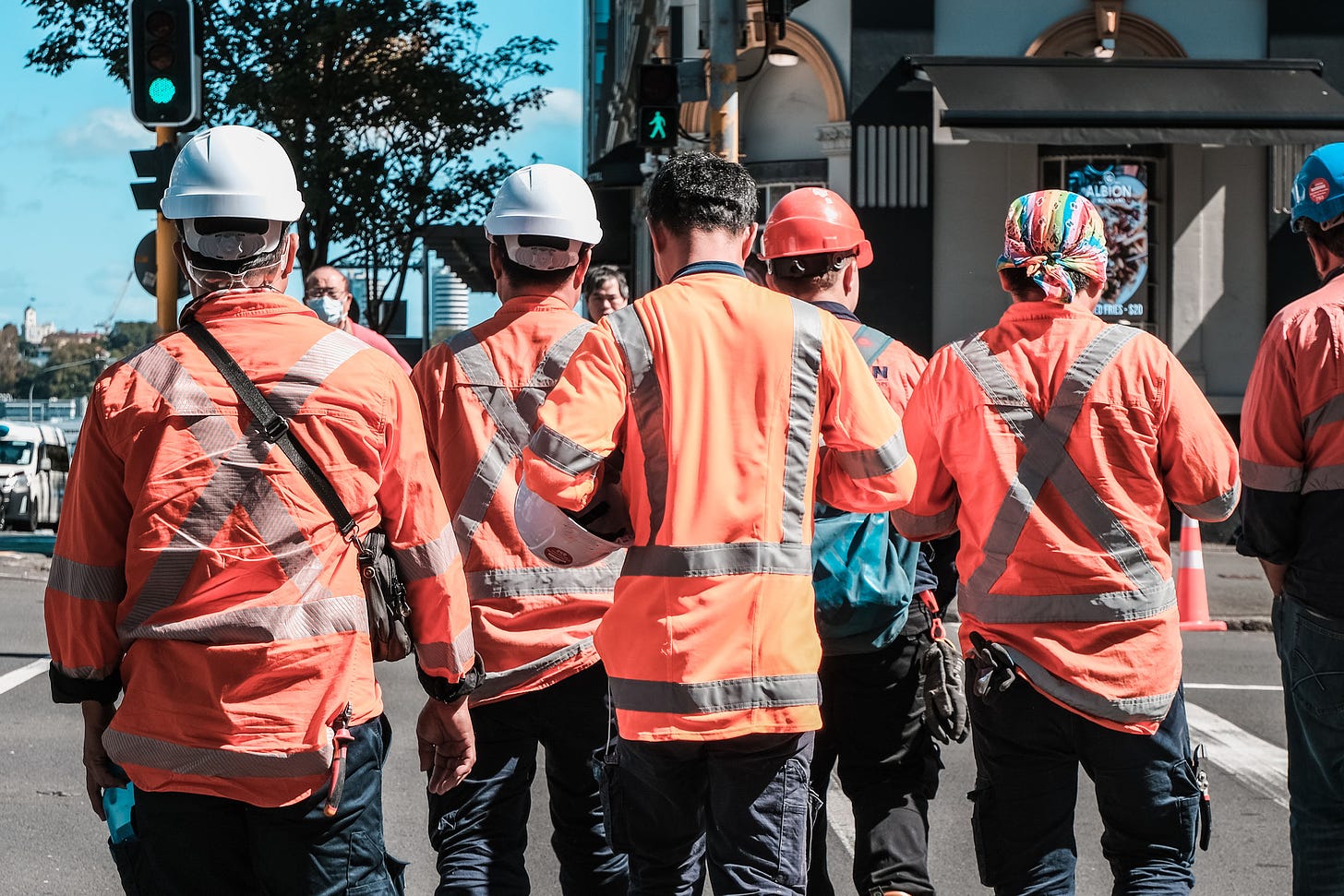
Mōrena. Long stories short; here’s my top six things to note in Aotearoa’s political economy around housing, climate and poverty on Tuesday, August 20:
The Human Rights Commission reports Aotearoa’s biggest visa scheme for temporary migrants “may be enabling potential human trafficking, with signs of systemic migrant exploitation and modern slavery”.
A international report calling for a ‘feather-light’ Spanish-style wealth tax on the richest 0.5% has found it would raise US$2.1 trillion per year globally and NZ$6 billion per year in Aotearoa.
Ecotricity is now offering a 21c/unit repurchase rate for rooftop solar power stored in batteries at peak times.
In a speech at Turangawaewae, Tuku Morgan accused the coalition Government of Christopher Luxon and an (absent) David Seymour of being a wrecking ball setting back Maori progress by 50 years.
A major report on health and safety has found the annual cost of workplace accidents and illnesses at $4.9 billion in 2023, up from $4.3 billion the previous year, while Aotearoa’s fatality rate remains significantly worse than Australia’s.
A massive and record-high heat dome over Antarctica has shunted cold and wet air up to us in an extreme event made more likely by accelerating climate change.
The Top Six short stories longer for August 20
1. This is not who we think we are
Damning reports from HRC and Public Service Commission ignored
The Human Rights Commission (HRC) yesterday released a report into the new Accredited Employer Work Visa (AEWV) scheme that has been the main source of the surge of over 200,000 migrants on temporary work visas into Aotearoa over the last couple of years.
It follows a barely-noticed report from an independent review by the Public Service Commission to the Government in February of the AEWV scheme, and the Government’s changes to the scheme in April, which have done little to change the exploitative nature of this temporary worker migration.
Here’s the Commission's outgoing Equal Employment Opportunities Commissioner Saunoamaali’i Dr Karanina Sumeo expressing grave concern in the HRC report about what has not been done to improve the scheme (bolding mine):
“What we heard goes beyond bad employer conduct and raises real concerns that the AEWV scheme may be enabling potential human trafficking, with signs of systemic migrant exploitation and modern slavery.
“The independent operational review in February outlined many instances of migrant exploitation, including reports that migrant workers were being forced to work illegally as part of organised crime networks. However, the policy settings contributing to exploitation were not part of the review and the changes made in April did not address the underlying human rights risks.” Saunoamaali’i Dr Karanina Sumeo in the HRC release.
The report itself detailed the following from workers it spoke to:
being scammed out of tens of thousands of dollars by unethical recruiters, losing their job immediately on arrival and then working in the construction sector, often for free on “unpaid trials”. They also obtained paid employment working long hours for well below the minimum wage.
having to live in crowded, unhealthy, unsafe housing or campgrounds and not having enough money for healthy food.
being scared to raise breaches of minimum entitlements and fearing losing their employment and immigration status. Workers described feeling bonded to their employer, with one worker calling the visa their “handcuffs”.
their families at home being left in debt to pay unethical recruiters and/or being threatened because they were unable to make the required repayments without the employment that was promised.
lack of action on complaints of migrant exploitation made to Government agencies. Many who experienced exploitation had not made complaints, and some expressed a lack of faith in the relevant authorities.
In my view, the fundamental reason for these temporary migrant schemes is to avoid a real conversation about population growth because firms in favour of the schemes say the migrants are only temporary and therefore infrastructure does not need to be built. That ignores the fact people need homes to live in while they’re here, roads to drive on or buses to travel on and can get sick or injured (see Chart of the Day).
It also assumes the most awful thing: we want people to come and work for us, but the moment there’s a downturn or it gets awkward and expensive, we expect them to just leave, and if they don’t, we’ll kick them out. It means we do awful things where we allow migrants to settle in, often on temporary visas rolled for over a decade, and then kick them out when they need to use a hospital or break a minor.
It’s our churn and burn economy writ large.
2. Solutions: ‘Adopt Spain’s wealth tax’
Tax Justice Network reports Spanish-style tax could raise US$2.1 trillion
The international Tax Justice Network released a report yesterday detailing how countries who adopted Spain’s ‘feather light’ wealth tax on billionaires could raise a collective US$2.1 trillion per year in taxes globally, and US$3.6 billion (NZ$6 billion) if applied in Aotearoa.
It modelled a progressive wealth tax of between 1.7% and 3.5% on the richest 0.5% of the people in 173 countries, including ours, and including the (minimal) effects of migration of the wealthiest and their wealth.
I’ve attached both the full report, the numbers in PDF and the spreadsheet here.
3. Solutions: Finally, a higher solar re-purchase rates
Ecotricity announced yesterday a 21c/unit repurchase rate at peak times from retail customers producing solar electricity with a battery on its plan.
4. Quote of the day
‘We will not go quietly into the night.’
“We have watched the Māori wrecking ball roll back 50 years,” Tainui iwi Chair Tuku Morgan said yesterday at the Koroneihana at Turangawaewae yesterday of the coalition’s agenda. He referred to the dismantling of the Maori Health Authority and legislation to force votes on Maori wards on councils.
“We will not go quietly into the night.Act’s real agenda is to de-Māorify this country.” Via NZ Herald’s Joseph Los’e
5. Chart of the day
Dying to go to Australia
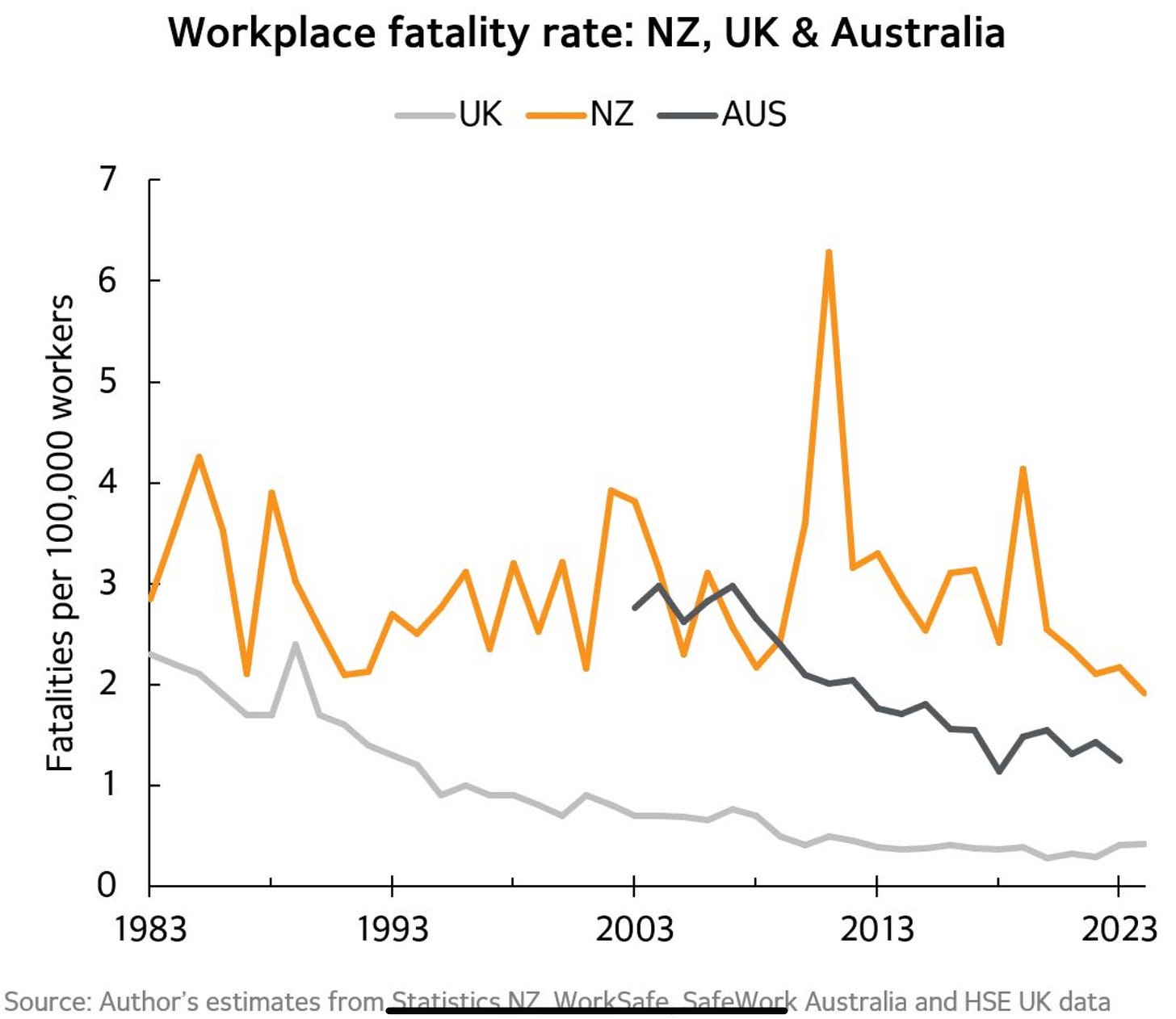
6. Climate graphic/chart/pic of the day
Where this cold snap came from
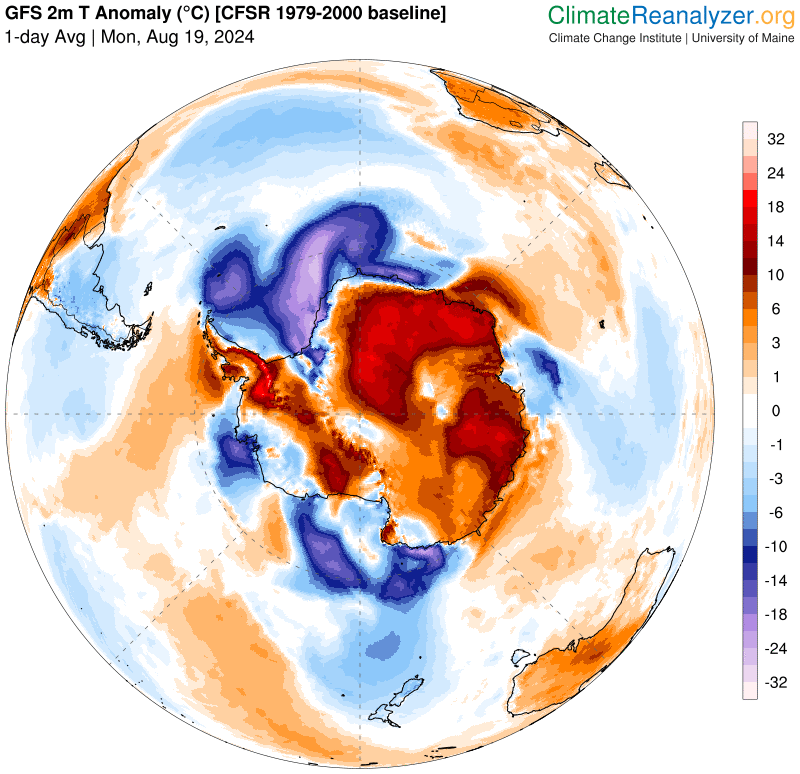
The best of the rest
Top six scoops and deep dives for August 20
Greenwashing deep dive: Fonterra accused of greenwashing to impress big foreign buyers RNZ’s Farah Hancock
Baby uplift investigation: Apology after autistic mum's baby taken - but it's too late to get him back NZ Herald-$$$’s Nick Jones
Housing deep dive: How well does the law protect tenants from 'bad' landlords John Campbell for 1News’ Fair Go
Health deep dive: 'Transformational shifts' in healthcare put at risk by reset RNZ’s Phil Pennington
Immigration graphic explainer: Time for a grown-up conversation about immigration FT (gift)’s John Burn-Murdoch
Interview with AAAP’s Brooke Pao Stanley Administering poverty via E-tangata’s Teuila Fuatai
The Kākā’s Journal of Record for August 20
Climate: The Environmental Protection Authority released data identifying Fonterra as the largest emitter for 2023-24 among participants in the Emissions Trading Scheme, responsible for nearly a fifth of net emissions. Agriculture was responsible for 49% of ETS participant emissions. Newsroom
Economy: The Business Leaders’ Health and Safety Forum released a report finding that the cost of work-related serious injuries, fatalities, and health issues in NZ rose 11.4% since last year to $4.9 billion. A halving in NZ's workplace injury rate since 2000 was attributed to fewer minor injuries, whereas serious injuries rose 20% since 2014, and our workplace fatality rate remains 60% higher than Australia’s and over 500% higher than the UK’s. RNZ, NZ Herald
Climate: The Green Building Council released an analysis of Ministry for the Environment and MBIE forecasts finding that an increasing shortage of natural gas will push up power prices in the coming years unless the Government acts to reduce demand. The Council adds that heating in buildings can be electrified, and the Coalition could reduce demand through the Warmer Kiwi Homes programme and restoring Government Investment in Decarbonising Industry funding.
Poverty: Te Kāhui Tika Tangata Human Rights Commission set out recommendations for improving the Accredited Employer Work Visa scheme, which it found is being misused to recruit workers to exploitative or non-existent jobs. Recommendations include ending the tying of visas to specific employers, implementing minimum ethical standards as a prerequisite for employer accreditation under the scheme, and running meaningful business checks. RNZ
Economy: BNZ's Performance of Services index for July found service sector activity was up 3.9 points from June, but remains below levels seen during the GFC. SEEK NZ's Employment Report for July found job ads increased by 3% in July for the first time since January, with increases in retail, hospitality & tourism, and Government & defence jobs responsible.
Economy: AUT Professor of Economics Tim Maloney published a predictive model which suggests unemployment may have already reached 4.8%.
Finally, some fun things
Cartoon of the day: ‘Making the boat go faster’
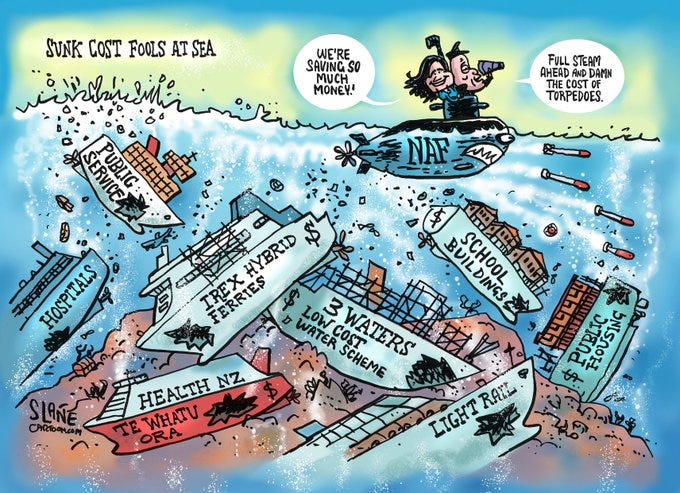
Timeline-cleansing nature pic:
‘It was worth it to get the stick’
Mā te wa
Bernard




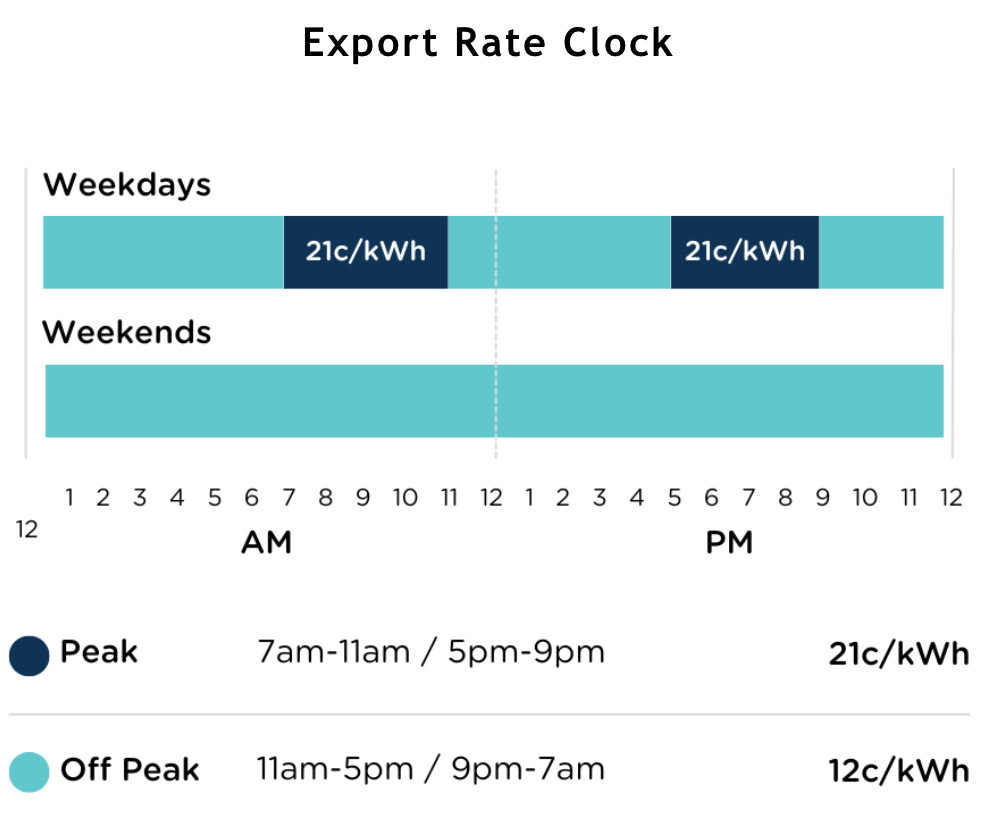










The ugliness inside our churn and burn economy